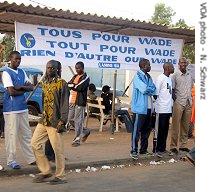-
(单词翻译:双击或拖选)
By Nico Colombant
Dakar
21 February 2007
On Sunday, Senegal will hold a presidential election, pitting incumbent1 Abdoulaye Wade2 against a crowded field of opposition3 candidates. The peaceful country is often described as having one of the best democratic systems in West Africa, despite its economic underdevelopment. As Nico Colombant reports from Dakar, President Wade is favored to win but he faces a boisterous4 opposition from several former close allies.
Senegal is a mostly barren land, burdened by grinding poverty.
Its infrastructure5, despite high government taxes, is woefully inadequate6 -- and minimum standards of sanitation7 are not met in most places.
But the presidential campaign, as is customary, is a time of promises and hope for a new beginning.
 |
| Signs for President Abdoulaye Wade's campaign are all around Dakar |
His supporters chant "Sopi", "Sopi" which means change in the local wolof language.
Mr. Wade says he needs more time to implement9 the changes he has set in motion.
Despite being in his 80s, his campaign style is bold.
At every stop, he promises to build new factories, new roads, new monuments to local heroes.
In this speech, he vowed10 to win more than 50 percent of the vote Sunday, thereby11 assuring a first round victory.
But his detractors are many, like these supporters of a former Prime Minister Idrissa Seck who say a generational change is needed.
The campaign has been marked by recurrent clashes and scuffles, sparking fears that tranquil12 Senegal is in danger of losing some of its stability.
Senegal is the only country in West Africa never to have experienced a military coup13.
Another former prime minister and close ally, Moustapha Niasse, is also running against Mr. Wade.
There are 14 opposition candidates and it is difficult to tell if combined they will be able to force a second round.
One opposition activist14, Mbaye Seck, certainly hopes so. "The actual regime added to all sorts of problems and all sorts of difficulties, and to the natural and social problems that we (have). now. That is why all Senegalese have one desire, to (end with) this government and to elect another one."
Senegal has a very young voting age population. Many of the country's two million new voters are barely 18, though many of those who participated in rallies are not of voting age.
With opinion polls banned in Senegal, it is difficult to tell which group will still be celebrating after votes are counted.
 收听单词发音
收听单词发音
1
incumbent

|
|
| adj.成为责任的,有义务的;现任的,在职的 | |
参考例句: |
|
|
|
2
wade

|
|
| v.跋涉,涉水;n.跋涉 | |
参考例句: |
|
|
|
3
opposition

|
|
| n.反对,敌对 | |
参考例句: |
|
|
|
4
boisterous

|
|
| adj.喧闹的,欢闹的 | |
参考例句: |
|
|
|
5
infrastructure

|
|
| n.下部构造,下部组织,基础结构,基础设施 | |
参考例句: |
|
|
|
6
inadequate

|
|
| adj.(for,to)不充足的,不适当的 | |
参考例句: |
|
|
|
7
sanitation

|
|
| n.公共卫生,环境卫生,卫生设备 | |
参考例句: |
|
|
|
8
socialist

|
|
| n.社会主义者;adj.社会主义的 | |
参考例句: |
|
|
|
9
implement

|
|
| n.(pl.)工具,器具;vt.实行,实施,执行 | |
参考例句: |
|
|
|
10
vowed

|
|
| 起誓,发誓(vow的过去式与过去分词形式) | |
参考例句: |
|
|
|
11
thereby

|
|
| adv.因此,从而 | |
参考例句: |
|
|
|
12
tranquil

|
|
| adj. 安静的, 宁静的, 稳定的, 不变的 | |
参考例句: |
|
|
|
13
coup

|
|
| n.政变;突然而成功的行动 | |
参考例句: |
|
|
|
14
activist

|
|
| n.活动分子,积极分子 | |
参考例句: |
|
|
|















